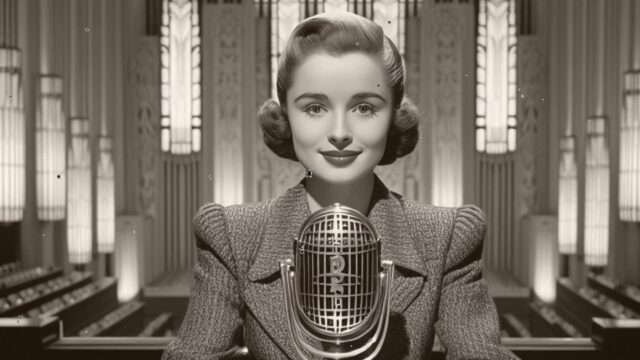Let’s start with a ridiculously brief and oversimplified look at what is meant by AI in the current climate, and specifically generative AI. It’s the big buzzword in technology and artistic circles right now. This is where, with a few prompts, questions and guidance, a computer program will construct the requested media to the best of its abilities. Note that I say constructed rather than created. Generative AI is built around huge data sets of existing creative works (you’ll hear this called training data) and mimics this data to construct the requested content.
The Eurovision Song Contest should embrace artificial intelligence.

Electric Twins, 1996 (AI Image, Microsoft Co-pilot)
It wouldn’t be the first time that the Song Contest has embraced new technology that has either disrupted the previously established norms or created a new norm by its use. The early Contests were built around developing and testing a continent-wide transmission network… and with the trials of 4K broadcasting in Turin and Liverpool, it’s clear that this part of the mission has not changed.
The Song Contest started with an orchestra but eventually moved with the times as new instruments and new techniques were adopted… eventually. Think of the use of synthesised music in popular music in the eighties and its notable absence in the Contest for many years. Look at the rules around instruments being represented on stage, forcing Gina G to dance around a typically beige 90s computer. Or the inclusion of high-energy dance routines to mimic the rise of the cinematic music video in the first decade of the 21st century.
Rather than an almost impossible-to-police “you can’t use AI at Eurovision”, the EBU and its broadcast partners should embrace AI and use the Contest to explore what impact the technology can have on the creative, competitive, and interactive experience.
With that, let’s think about a handful of areas where AI is already being used and how these could relate to our Song Contest.
Writing The Song
You might be familiar with predictive text on your smartphone, where small datasets (the start of a word and where it is located in a sentence) are compared to a dataset of many words, and the program predicts what the next word should be. Scale this up with larger datasets, more powerful computers, and some nifty programming, and you get to the point where you can go from “You are going to be a songwriter who is going to write a song that can win the Eurovision Song Contest… write the lyrics for the chorus,” to get to this…
In the shadows where our secrets intertwine,
Heartbeats racing, breaking all the lines.
A dance of danger, a love we can’t deny,
Whispers in the dark, under the midnight sky.
It’s a touch more involved than the single question, so if you want to see the full flow of prompts and suggestions, you can read the creative process behind “Midnight Whispers” here. Given that much of generative AI is based on prediction, it will be no surprise that the AI suggested we ask Eleni Foureira as the singer.
They’re Already Scoring The Songs
If you’re looking for more potential songs from AI, let me introduce the AI Song Contest and the highlights from the 2023 edition.
Selecting The Song
The larger the dataset, the more accurate the Generative AI can be when delivering a result. The dataset of Eurovision songs that have reached the televised shows is very much available; the dataset of every song submitted and how well they performed in selections is significantly larger; throw in recent chart success across Europe without the limitation, and you have yourself an extensive dataset of sogns cross-referenced with various levels of success.
You’ll also find various musical trends, the ebb and flow of genres and themes, and how they perform in different countries.
That’s the sort of data that can help construct a song. It’s also the sort of data that a delegation can use to sift through the hundreds, if not thousands, of submissions made to every broadcaster each year. Which are using tired motifs? Which are on point with the latest fashions? Which are likely to score highly and fight for a podium place or a win at the Song Contest?
Let your AI Engine sift through the potential songs to pick out the ones that tick all the relevant boxes.

Lily Johnson, 1952 (AI Image, Microsoft Co-pilot)
Why Not Watch This?
Georgia Institute of Technology’s Wei Xu has assembled a basic AI engine to select suitable films based on certain criteria. It’s not a huge step to ask it to judge Eurovision-bound songs to find the most likely to see success.
Improving The Performance
AI datasets can also be used comparatively. Emotion Analysis can take in data and run it through the large data set to offer feedback on what is working and what is not.
By taking in the performer’s body language and facial expressions, Emotion Analysis can use generative AI to create an artificial audience that reacts to the performance on stage. Rather than the subjective eye of a creative director or television producer, the code could pick out the areas where the performance is weak and offer suggestions. These could range from the emotions seen on the performer’s face, the colour palette, and even the different camera angles available to the broadcast.
You could take that a step further and capture not only the performance at the various pre-parties but you could also record the audience reaction to collect specific Eurovision audience data to tweak the performance in the final few weeks ahead of the show.

International Jury Bot, 2031 (AI Image, Microsoft Co-pilot)
Do The Robts Think I’m Funny?
Chicago-based stand up Colleen Lavin brought her developer experience to the Edinburgh Fringe 2023 with Murderbot. Using sentiment analysis, Murderbot could listen to the audience throughout the one-hour set and decide at the show’s end if the audience thought the show was funny enough.
A Better Experience
The Eurovision Song Contest is more than a three-minute song. The build-up and sense of excitement is part of the community lore, but as the May spectacular draws ever closer, the community grows as people worldwide get ready for the live show.
Much of that anticipation and discussion happens online. While there are many venues where this can take place, there will be a push from those organising the Contest around the Eurovision mobile app and to visit the official site. Let’s focus on the app and the potential of adding AI to it.
We’re in the same world of massive data sets, specifically data on what music people like listening to, how they rate the songs in the contest, what they share on other social networks, what they spend time on and what they skip over. With just a few choices made by a new user of the app—which you could consider a prompt—the AI routines can use the main data to predict what will improve the interactive experience for the user. This should lead to a more personalised moment and capture more of the thrill of the Contest than a flat app built around fixed playlists and biographical data.

Svante Sandahl and his Big Music CEO watch over their team (AI Image, Microsoft Co-pilot)
Isn’t This Facebook?
You’d be right if that sounds like the mythical algorithms that drive what you see on Facebook, Twitter, HurdlePile, and Instagram. It might not be clearly labelled as AI, but the recommendation engines that drive online experiences are prevalent and rarely visible.
An Improved Broadcast
The same AI features that have made the app useful and engaging in the run-up to the Song Contest can continue to be active during the show, but some interesting choices can be made, depending on how much data the EBU would want to make public.
Through the existing app, you can already cheer for your favourite songs while they are performing. That data, independent of the voting, can be used to encourage voting, to show which songs are “in the lead” and which need more help from voting. Rather than a coarse chart on the screen, the AI can be tailored to each user, bringing them closer to the Eurovision experience and feeling a greater connection to the show than ever before.
Yet there are more practical ways that AI can help, and that’s through translation. Large Language Modules—specific text-based datasets— perform well as translation engines. Recently, the lingua franca of the Contest has been predominantly English; the local commentators are the primary translation source. Now imagine the Contest’s spoken and sung language pushed through an AI translation engine, be it for subtitles, commentators, or real-time translation on a red-button-styled interactive TV choice of the audio channel. That reduces the language barrier at the Contest and increases the international appeal.

Catherine Saunders, continuity announcer, 1957 (AI Image, Microsoft Co-pilot)
The Second Screens
Both the official Eurovision app and SVT’s Melodifestivalen app, have audience feedback mechanisms in place, through cheering and tapping hearts.
The second-screen experience is well-documented and has been a phenomenon long before AI made itself known to the public, but the techniques used in second-screen apps can benefit from the use of AI. A good place to start would be “Improving Interactive TV Experience Using Second Screen Mobile Applications” by Mu Mu (The University of Northampton), and William Knowles, Yusuf Sani, Andreas Mauthe and Nicholas Race (Lancaster University) (PDF Link).
Eurovision Can’t Live Without AI
Artificial intelligence is a software tool whose uses are as varied and diverse as those engaging in the Eurovision Song Contest. It’s a tool that can change the Contest in large and small ways. There is no point in simply shouting, “You can’t use AI at Eurovision,” because these tools are here to stay across the entire spectrum of creativity.
The Contest should embrace AI, just as it did with moving on from the orchestra, allowing synthesisers and other electronic to appear on backing tracks (without hilariously forcing them to be on stage so you could see all the instruments), introducing televoting and then app voting to bring the audiences closer, and bringing in first HD and then 4K to the broadcasts.
If the Eurovision Song Contest is about new ideas, new technology, and sharing those lessons with the members of the EBU, then let the Song Contest be the child of the AI revolution.










well this is bleak. i strongly disagree with this!
Who wrote this?
Touché 🙂
I do have the AI-written version of the article, it’s likely going to Patreon. Whether the article is better than mine I’ll leave to the imagination.